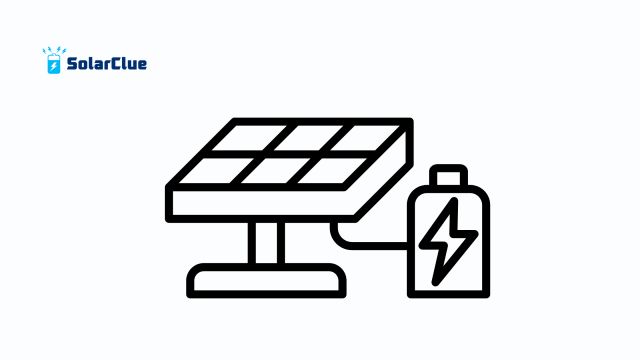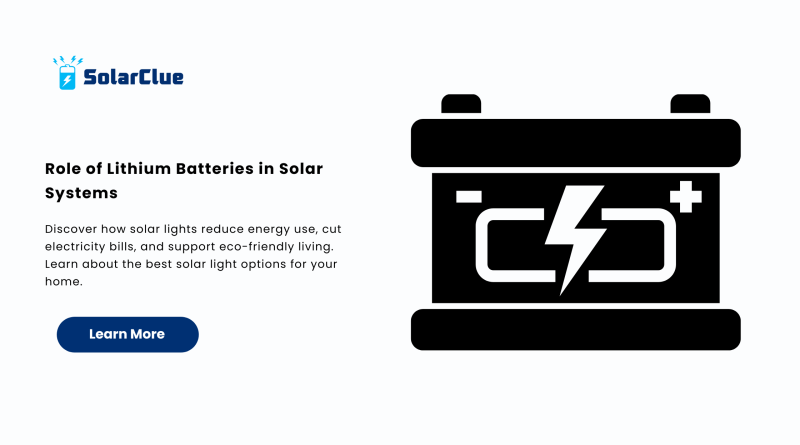Role of Lithium Batteries in Solar Systems
In today’s rapidly evolving renewable energy landscape, solar power has emerged as a leading solution for sustainable electricity. However, the true potential of a solar system can only be unlocked with efficient energy storage—and that’s where Lithium Batteries in Solar Systems play a pivotal role. These advanced solar batteries not only maximize energy usage but also ensure round-the-clock power availability, even when the sun isn’t shining. As energy demands grow and grid reliability becomes uncertain, the need for smarter, more efficient solar battery solutions has never been more urgent.
Table of Contents
- 1 Understanding the Basics of Solar Power
- 2 What Are Lithium Batteries?
- 3 Why Storage Matters in Solar Systems
- 4 Benefits of Lithium Batteries in Solar Systems
- 5 Comparing Lithium Batteries to Other Solar Batteries
- 6 How Lithium Batteries Improve Solar System Performance
- 7 Safety and Reliability of Lithium Batteries
- 8 Cost Consideration and ROI
- 9 Ideal Applications of Lithium Batteries in Solar Systems
- 10 How to Choose the Right Lithium Battery for Your Solar System
- 11 Environmental Benefits of Lithium Batteries
- 12 Government Incentives and Support
- 13 Maintenance Tips for Long-Lasting Performance
- 14 Trends and Innovations in Solar Battery Technology
- 15 Conclusion
- 16 FAQs:
Understanding the Basics of Solar Power
Solar power is harnessed from sunlight using photovoltaic (PV) panels. This renewable energy is rapidly becoming a primary source of electricity for residential, commercial, and industrial needs. The effectiveness of any solar system significantly depends on how efficiently energy is stored, and that’s where solar batteries come in.
What Are Lithium Batteries?
Lithium batteries are rechargeable batteries using lithium-ion technology, known for their high energy density, long cycle life, and lightweight design. Unlike traditional lead-acid batteries, lithium batteries in solar systems offer better efficiency, faster charging, and greater longevity.
Why Storage Matters in Solar Systems
Solar energy is not always generated when it’s needed—solar panels only produce electricity during daylight hours. This mismatch between supply and demand highlights the need for effective storage. A solar battery stores excess energy generated during the day, making it available for use at night or during power outages.
Benefits of Lithium Batteries in Solar Systems
1. Higher Efficiency
Lithium batteries in solar systems typically operate at 95% or higher efficiency, meaning minimal energy is lost during the charge/discharge cycle.
2. Longer Lifespan
They last significantly longer than lead-acid counterparts, offering up to 10 years or more with consistent performance.
3. Compact and Lightweight
Their compact size and lower weight make them ideal for rooftop solar installations or mobile solar setups.
4. Maintenance-Free Operation
Unlike traditional solar batteries, lithium-ion batteries don’t require water refilling or frequent maintenance.
Comparing Lithium Batteries to Other Solar Batteries
Lead-Acid Batteries
Older technology, cheaper upfront but lower cycle life and efficiency.
Flow Batteries
Innovative but expensive and complex to install.
Lithium-Iron Phosphate (LiFePO4)
A subtype of lithium battery, offering enhanced safety and thermal stability.
How Lithium Batteries Improve Solar System Performance

Lithium batteries enhance solar system performance by enabling energy independence. Households can run on solar power even after sunset, reducing grid reliance and lowering energy bills. They’re also ideal for hybrid systems where backup power is essential.
Safety and Reliability of Lithium Batteries
Modern lithium batteries come with built-in Battery Management Systems (BMS) that protect against overcharging, overheating, and deep discharging. These features ensure the safe integration of solar batteries into residential and commercial setups.
Cost Consideration and ROI
While the upfront cost of lithium batteries in solar systems is higher, the long-term savings and extended lifespan make them a cost-effective solution. Homeowners can expect a higher return on investment due to reduced energy bills and minimal maintenance costs.
Ideal Applications of Lithium Batteries in Solar Systems
Residential Homes
Perfect for rooftop solar setups requiring compact and efficient energy storage.
Off-Grid Cabins
Enables complete independence from the grid with reliable energy backup.
Commercial Buildings
Provides scalable energy storage solutions to offset peak demand charges.
How to Choose the Right Lithium Battery for Your Solar System
- Capacity Needs: Assess your daily power consumption
- Battery Life: Look for warranties of 5-10 years
- Brand Reputation: Opt for well-reviewed and certified manufacturers
- Integration Compatibility: Ensure it works with your existing solar system
Environmental Benefits of Lithium Batteries
Lithium batteries are more environmentally friendly than traditional options. They are recyclable and significantly reduce the carbon footprint by supporting cleaner energy sources.
Government Incentives and Support
Many regions offer subsidies, rebates, or tax credits for installing solar systems with solar batteries, making lithium batteries an even more attractive option.
Maintenance Tips for Long-Lasting Performance
- Keep the battery in a cool, dry place
- Monitor battery status via BMS or connected app
- Avoid full discharges regularly to prolong life
Trends and Innovations in Solar Battery Technology
The future of solar batteries lies in improved energy densities, AI integration for smart usage, and blockchain for energy trading. These innovations will further enhance the functionality of lithium batteries in solar systems.
Conclusion
Incorporating lithium batteries in solar systems is a game-changing move toward achieving energy independence and sustainability. Their high efficiency, long life, and minimal maintenance make them the preferred choice for modern solar power applications. Whether you’re setting up a new solar system or upgrading an existing one, lithium batteries ensure you’re future-ready.
Ready to explore the world of smarter solar solutions? Visit our main site at solarclue.com or read more insightful guides at blog.solarclue.com — your journey to sustainable energy starts here.
FAQs:
1. Are lithium batteries better than lead-acid for solar systems?
Yes, they offer higher efficiency, longer lifespan, and less maintenance compared to lead-acid batteries.
2. How long do lithium solar batteries last?
Most last between 10 to 15 years depending on usage and quality.
3. Can I retrofit lithium batteries into an existing solar system?
Yes, but ensure compatibility with your existing inverter and charge controller.
4. Are lithium batteries safe for residential use?
Absolutely. Built-in BMS features provide comprehensive safety mechanisms.
5. Do lithium solar batteries work in cloudy weather?
They store energy generated on sunny days, making power available even when it’s cloudy.



